Last weekend saw the Dragon Boat Festival 端午节, one of two 'new' three-day weekend public holidays introduced by the Chinese government.
While I didn't actually consume any that particular Saturday, when I made my way to the post office, dragging more than 20 kilograms of belongings, I was pleasantly assaulted by strong whiffs of freshly steamed glutinous rice dumplings. Tempting, but I rather prefer my dumplings packed with savoury or sweet fatty pork and chestnuts than red beans, green beans, or a meagre sliver or two of lean meat, which appears to be what the Chinese offer. Alternatively, I will accept them all rice and no filling with a generous dollop of sugar, thank you very much.
One of the Americans in Chengde 承德 received some unexpected dumplings. A Chinese lady who lived in his building walked into his apartment, dumped a bag of them on his kitchen table and left without saying a word. No small talk, awkward questions, smiling stupidly, and still there's free food. A perfect neighbour for me, methinks.
The American told this story at a local restaurant where we had dinner. The restaurant's speciality (and name) is 干烧鱼, which appears to be a sort of fish dish that's been deep-fried too long. Tasted like it too. The Chinese constantly revolved the lazy Susan such that the fish almost always stopped in front of me. She was of the opinion that I should eat it since I ordered it. Admittedly, I was seduced by the notion of fish, but the dish came highly recommended by the Americans, who even made certain it had been ordered. But of course their palates are too delicate to be made to endure that crisp disaster of a fish.
Strangely, although we were a party of five, the Chinese thought three dishes were sufficient. Having spent lunchtime that Sunday in a 4-hour Chengde-bound bus inhaling cigarette smoke and the entire afternoon hiking in the Chengde hills in search of oddly-shaped rocks, I suddenly missed my ex-colleagues. My first colleagues in China, the ones who would go as far as to order to a 1:1 ratio at lunch. I ate well back then.
One of the party was vegan, so the Chinese picked a dish of green peppers, because she liked spicy food, in spite of the waitress explaining that that particular dish took a while to prepare. The other order was 鱼香肉丝, a dish of pork slivers and shredded carrots in a salty, spicy sauce. Apparently her favourite dish, and thus a must-have.
As the food quickly ran out, three of us were forced to ask for a bowl of rice each. To salvage the situation, an additional order of vegetables was also made. It thankfully turned out to be a plate of stir-fried zucchini.
Dinner was split 5 ways, and the group adjourned to a residential compound and kicked a Chinese shuttlecock around until two American-accented Filipino girls, friends of the Chengde Americans, showed up. The group then made its way to the other American's flat, where the three of us from Beijing were afforded the night's lodging free of charge.
There, I proceeded to take a shower and then got into bed, while the rest put a movie on loud, drank beer and the Americans chain-smoked. Smelt like it, anyway. A couple of hours later, the two Filipinos left and the Finnish went to bed, leaving the two Americans and one Chinese to partake in more alcohol, movies and cigarettes. I know this because Chinese flats have thin walls/doors and I am a decidedly light sleeper.
A couple more hours later, one of the Americans knocked over a bottle of something in an attempt to find a glass of salt water to make himself feel better. I imagine he then fell asleep on the couch. Afterward, the sounds of vomitting and weeping began. The Chinese was weeping because she was having trouble "releasing" herself, and vomitting because she had had too much to drink (this second point is pure speculation on my part). The American was consoling her with "no one can help you if you don't let them", which would sound fairly reasonable if it wasn't followed by hee-hee-hees.
It was light when the television was finally switched off and silence reigned. Didn't last long. Light meant people would get up and about, so doors started banging and I was treated to snatches of conversation as people walked past the ground floor flat. Guess it was a good time as any to make my way to breakfast and the massive Mountain Resort (of Emperors KangXi and QianLong) 避暑山庄.
The Finn and I met up at the Mountain Resort and we spent the entire day walking around lakes, up and down a mountain, through a valley, past tame spotted deer and was overtaken countless times by mini-trams of Chinese tourists.
I was also enlightened: Last night was apparently a typical young-single-American weekend. Learning that and seeing Chengde in two days, not half bad eh? While you'll've to nab yourselves some young single Americans to experience the sleeplessness, here's a glimpse of some loverly bits of Chengde, the city in the green mountains of the Hebei province.
Random sections of the Great Wall can be seen during the 4-hour bus ride to Chengde.

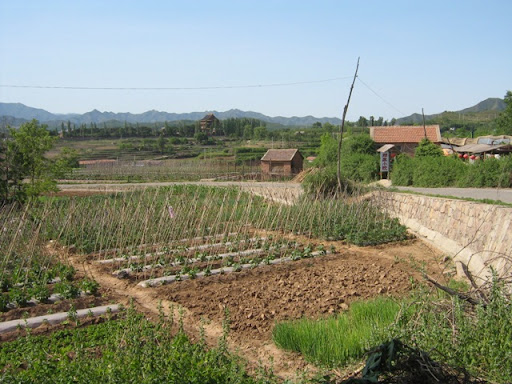
Lots of agriculture going on in the Hebei province, being a little further away from the desert sands than Beijing.
Pule Temple 普乐寺, built in 1766 during Emperor Qianlong's reign, is a UNESCO World Cultural Heritage site.
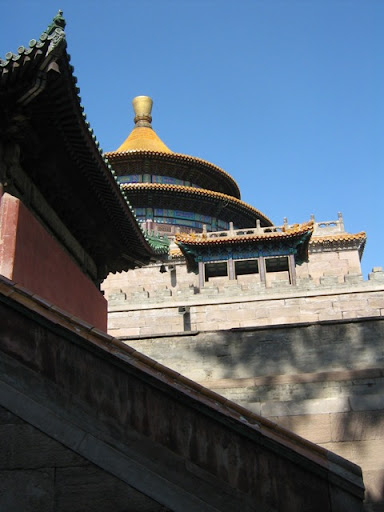
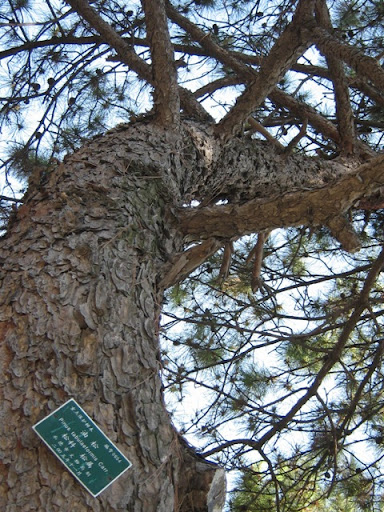
油松: One many old pine trees found within the temple's compound.
Built in a mixture of Han and Tibetian style similar to Beijing's Temple of Heaven 天坛, Emperor Qianlong named it Pule Temple, "implying universal happiness, unity and peace".

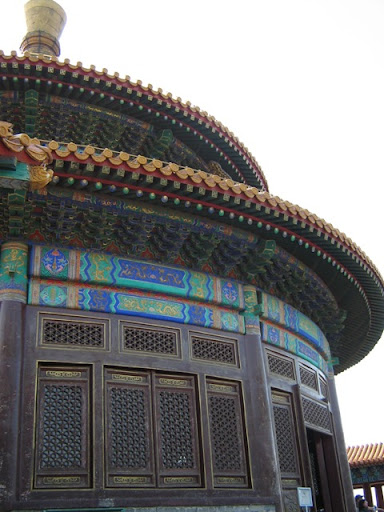
The main dome is a smaller copy of Beijing's Temple of Heaven.
To the east of the temple are the Sledge Hammer Peak 磬锤峰 and Toad Rock 蛤蟆石.
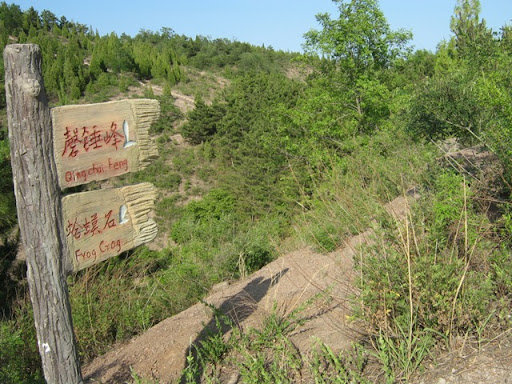
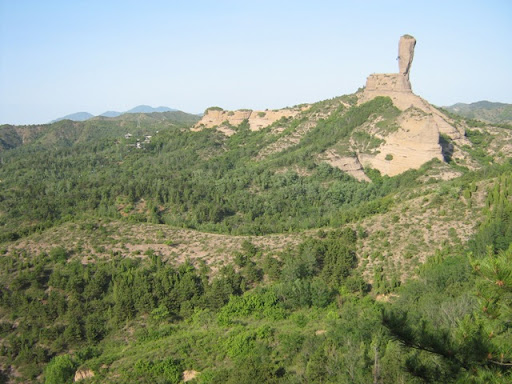
Which are a long, long way away.
But we got there eventually, of course.


Chinese visitors come armed with sticks of red incense, which they wedge on the Toad Rock for health. Or luck, or some such.
Above the various doorways of the main hall of the Mountain Resort 避暑山庄 hang four poems penned by one of the emperors, each written during his visits to the resort.
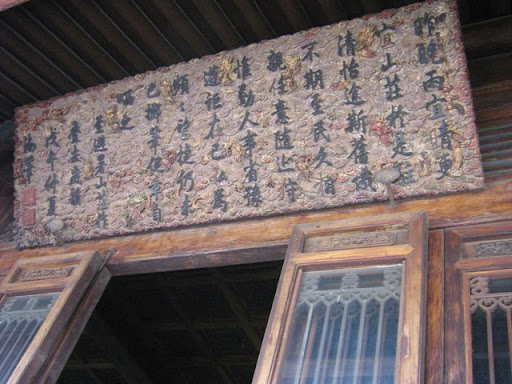
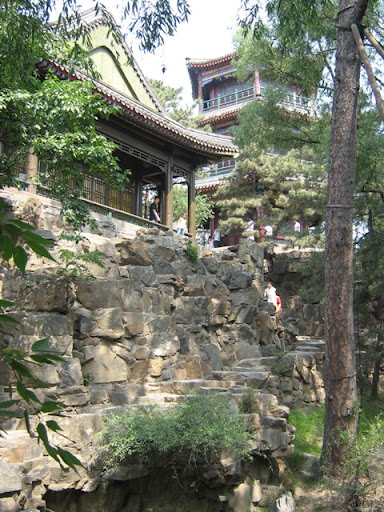
One of many pavilions dotting the massive Mountain Resort, which is the largest imperial palace garden in China and a UNESCO world cultural heritage site.
One of many temples in the resort. The 5.64-million-square-metre resort has a palace area, lake area, plain area and mountain area to reflect the characteristics of north and south China.
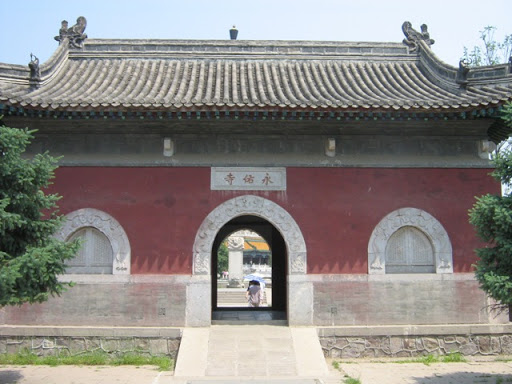

Unfortunately, Chengde is located in the northern region, which suffers from water shortage, so many of the little rivers and streams that used to be presided over by "gates" such as this have all but dried up.

